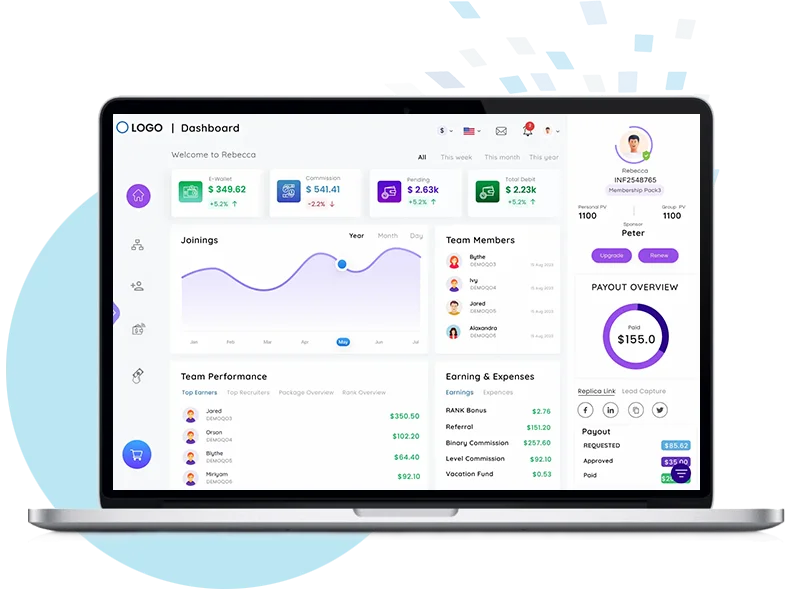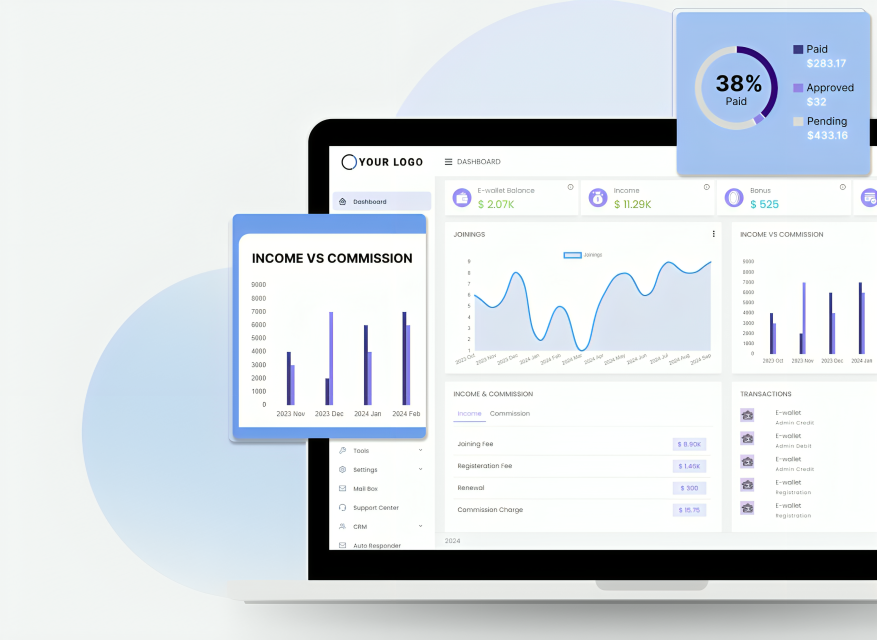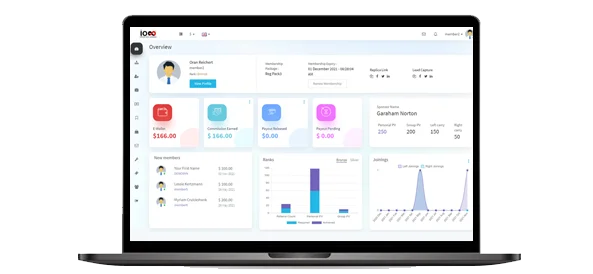Multi-Level Marketing (MLM) has long been a powerful business model, combining the reach of direct sales with the strength of personal networks. Multi-Level Marketing integration with Shopify offers businesses a powerful way to expand their reach and boost sales through a network of distributors.
While Shopify is primarily built for traditional e-commerce, the addition of MLM software allows companies to use the power of direct sales and team-driven growth. Whether you’re a startup or an established business, integrating Shopify with MLM can simplify your operations, automate commission structures, and empower distributors with tools to manage their downlines and earnings. In this blog, we’ll explore the key benefits, features, and challenges of integrating MLM into your Shopify store.
What is Shopify MLM?
Shopify MLM refers to the integration of multi-level marketing (MLM) features with the Shopify ecommerce platform, allowing businesses to combine traditional online retail with MLM structures.
Shopify MLM allows companies to provide adaptable compensation plans, monitor commissions, and manage downlines, all while utilizing Shopify’s powerful e-commerce features for product management, payment processing, and customer support. This integration enables MLM businesses to broaden their reach and optimize operations within a well-established e-commerce framework.
What is Shopify MLM Software and How Does it Work?
Shopify MLM software integrates multi-level marketing (MLM) functionality with the Shopify ecommerce platform, enabling businesses to manage both product sales and network marketing efforts in one place.
Shopify supports multi-level marketing (MLM) through third-party software integrations and applications that extend the platform’s capabilities and adds MLM-specific functionality to the platform. These integrations provide key features essential for MLM businesses, including affiliate management, which allows store owners to recruit and manage distributors or affiliates effectively.

Why do E-Commerce Businesses Need Shopify with MLM Integration?
MLM businesses generated over $201 billion in 2022, while Shopify powers 4.4 million stores. By combining these two forces, businesses can maximize revenue.
What is Shopify-MLM Plugin?
A Shopify MLM plugin is a third-party application or integration designed to enable Multi-Level Marketing (MLM) functionality within a Shopify store. Shopify, primarily built for traditional e-commerce models, doesn’t have native MLM capabilities. As a result, MLM plugins or apps are used to extend Shopify’s core features, allowing businesses to implement MLM structures, manage distributors, track commissions, and more.
Features of Shopify MLM Plugin

Integration with Shopify Store
The Shopify MLM Plugin effortlessly connects with your Shopify store, providing a unified user experience.

User-Friendly Interface
The Shopify MLM Plugin is designed with a clean, intuitive interface that balances advanced functionality with simplicity.

Affiliate & Referral Program Support
The Shopify MLM Plugin tracks referrals and automates reward distribution to keep affiliates motivated.

Multi-Currency and Language Support
With built-in support for multiple currencies and languages, the Shopify MLM Plugin makes it easy to localize your store and communications globally.

Customizable Referral Links
In a Shopify MLM Plugin, each member is provided with a unique referral link, allowing for precise tracking of their sales and recruitment activities.

Customizable Payout Thresholds
The Shopify MLM Plugin also offers flexible payout management through customizable thresholds along with a variety of payout methods.
Benefits of Integrating Shopify with MLM Software
Shopify MLM Software offers several benefits that enhance the functionality of your business, simplify operations, and maximize profitability. Here are some key benefits:

Automated Commission Tracking and Payments
Shopify MLM software automates commission management based on both direct sales and sales made by a distributor’s downline.

Smooth Affiliate Management
Shopify MLM software helps efficiently manage distributors or affiliates, track their performance, and monitor their recruitment efforts.

Improved Sales and Recruitment Tracking
MLM software with Shopify allows for real-time tracking of sales and the performance of your entire network, downline growth etc.

Scalability
As your MLM business grows, Shopify affiliate marketing ensures that you can scale your operations without technical difficulties.

Improved Analytics and Reporting
Shopify MLM software provides detailed reporting features that allow business owners to analyze sales, bonus and commission structures and distributor activity.

Time and Cost Efficiency
By automating key MLM processes such as commission distribution, downline management etc, integrating Shopify with MLM software reduces administrative work.

Customization of Compensation Plans
Shopify MLM software integration allows you to easily customize your compensation plan to suit the specific needs of your business.
Key Considerations Before Integration
Before integrating Shopify with MLM software, there are several key considerations to ensure that the integration aligns with your business needs and growth goals. Below are important factors to evaluate:

Choosing the Right MLM Software Compatible with Shopify
Different MLM software offers varying features, so choose one that meets the unique needs of your business. Look for features such as multi-tiered commission structures, affiliate and distributor management, automated payouts, and detailed reporting.
Evaluate whether the software supports the type of MLM model you’re using (binary, matrix, unilevel, etc.). Ensure that the integration and data migration is smooth between the two systems (e.g., product sales, customer data, and MLM commission tracking).

Ensuring Data Security and Compliance
MLM businesses involve handling sensitive customer and distributor information, such as personal data, sales transactions, and payment details. Ensure the software complies with updated data security protocols to protect this information.
MLM businesses must operate within the legal boundaries of direct selling and multi-level marketing. Choose an MLM software that helps ensure your business stays compliant with these regulations and provides tools to avoid running afoul of pyramid scheme laws. Look for clear and transparent compensation plans, proper product focus (sales over recruitment) and anti-fraud features.

Assessing Scalability and Customization Options:
As your MLM business grows, the software must be able to handle distributor management, customers, transactions, and complex commission structures. Look for software that can handle increasing transaction volumes, more affiliate levels, and more product offerings without compromising performance.
It’s of primary importance to choose an MLM software for Shopify that allows for easy customization of commission plans, affiliate bonuses, tier structures and other key elements of your MLM program. The software should also let you customize the referral program setup such as flexible payout schedules, different payout methods or rewards systems.
Step-by-Step Guide to Integrating Shopify with MLM Software
Step 1: Set Up Your Shopify Store
-
Configure your shopify store for managing products, payments, and shipping.
-
Add your products, set up payment gateways to accept customer payments, and configure shipping options.
-
Ensure that your Shopify plan allows for third-party integrations or API access.
Step 2: Connect Shopify to MLM Software
Option 1: Pre-Built Integration Tools
Some MLM software providers offer ready-to-use Shopify plugins or apps designed to simplify the integration process.
-
Start by installing the relevant plugin from the Shopify App Store.
-
After installation, authenticate the connection using the API keys or login credentials provided by the MLM software.
-
Once authenticated, map your Shopify products to the MLM inventory system and commission plans, ensuring the proper synchronization between both platforms.
Option 2: Custom API Integration
If you require more customization, you can integrate Shopify with MLM software via API.
-
Begin by obtaining the API documentation from both Shopify and your MLM software provider.
-
Then, collaborate with a developer to set up the integration, ensuring Shopify orders and customer data sync with the MLM system.
Step 3 : Configure MLM Software Settings
-
Input your compensation structure in the MLM software.
-
Specify commission percentages, the number of levels in your downline and any bonus or reward structures.
-
Choose how commissions will be paid out to distributors and define the payout schedule.
-
Ensure your MLM software has automated inventory management that easily allows sync with your Shopify products.
Step 4 : Test the Integration
-
Conduct test transactions to ensure that the integration between Shopify and the MLM software is functioning correctly.
-
Test sales made through distributor links, verifying that commissions are calculated properly and checking that inventory updates correctly.
-
Make sure that your MLM software is accurately tracking the downline and commissions earned by both direct and indirect affiliates.
-
Test different payment methods and verify that payouts are processed without errors.
Step 5: Launch and Monitor Performance
-
Once the setup is complete and tests are successful, you can launch your MLM program to your network.
-
Allow your distributors to start promoting products and earning commissions.
-
Use the analytics and reporting features in the MLM software to track the performance of your distributors and monitor the overall success of the MLM program.
-
Look for trends in sales, recruitment activity, and downline growth to identify areas of improvement.
Top MLM Software Options for Shopify mlm sofware Integration
Infinite MLM Software

Infinite MLM is a top MLM software platform, renowned for its advanced features. It empowers multi-level marketing organizations by providing efficient downline monitoring, accurate compensation calculations, and secure payment processing, making it the best Shopify MLM Software.
Infinite MLM Software has a Shopify integration that simplifies inventory management and ensures that your MLM business runs smoothly while expanding its reach through Shopify’s ecommerce platform.

Services Provided
MLM Software Development, Mobile App Development, E-Commerce Integrations, Consulting Services.

Types of Software Available
MLM Software, Direct Selling Software, MLM Mobile Apps, Affiliate Marketing Software, Commission Management Software, Mobile Recharge MLM Plan Software, Smart Contract MLM Software.

Integrations
Payment Gateways, SMS Integrations, CRM Systems, E-commerce Platforms, Social Media Integration.
Simple Affiliate Software

Simple Affiliate Software offers a straightforward platform that doesn’t overwhelm users with excessive features. It is a perfect fit for startups and small to medium-sized businesses seeking a straightforward and affordable affiliate program solution. Its user-friendly interface and low cost make it an excellent choice as a Shopify MLM Software for teams with limited marketing resources or technical expertise.

Key Features of Simple Affiliate Software
User-Friendly Dashboard, Automated Affiliate Tracking, One-Click Payouts, Customizable Branding, Easy Setup, Automated Payments, Integrations.
DirectScale

DirectScale is the ideal network marketing software for data-driven businesses aiming to optimize operations and boost revenue. This software provides insightful dashboards, trend analysis, and powerful modeling capabilities, akin to other MLM solutions, making it a good choice as a Shopify MLM Software.

Key Features OF DirectScale
User-Friendly, Flexible Configurability, Self-managed Commission Payouts, Scalable Business Operations, Custom Branding, Up-to-date REST APIs, Free Customer Support.
Best Practices for Successful Integration
Successful integration between Shopify and MLM software doesn’t end with setup; it requires ongoing attention to ensure that both systems run smoothly, and that both the business owner and affiliates have a smooth experience.
Regular Updates and Maintenance
Both Shopify and MLM software receive frequent updates to improve functionality, security, and performance. Regularly check for new features, bug fixes, and security patches for both platforms.
Every time an update is released for Shopify or MLM software, ensure that both systems remain compatible. Conduct routine checks for potential vulnerabilities or outdated components that could compromise user data or payment information.
Training Staff and Distributors on New Systems
When new features or functionalities are introduced, make sure that your team has the training and support to use them effectively. This includes updates on commission calculation methods, payment systems, referral link tracking, and inventory management.
When you implement new systems, products, or updates, ensure that your distributors are properly onboarded and trained. Make sure they understand how to access their affiliate dashboards, view sales data, track commissions and manage their referrals.
Monitoring Performance and Gathering Feedback
Monitor the performance of your integrated system using both Shopify and MLM software analytics tools. Key performance indicators (KPIs) to track include: sales volume, referral conversion rates, commission calculations, downline activity.
Set up regular surveys or feedback forms for distributors to share their experiences with the software, usability, and overall MLM program. This helps you identify areas for improvement, potential pain points or desired features that could improve their experience.
Common Challenges in Shopify MLM Software with Solutions
Integrating Multi-Level Marketing (MLM) with Shopify presents several challenges that businesses need to address to ensure smooth operations. Here are some of the common challenges:
Challenge
MLM businesses typically have complex compensation structures with multiple layers, commissions, bonuses, and incentives, which Shopify isn’t built to handle natively.
Solution
Custom solutions or third-party apps are needed to track commissions for downlines, team bonuses, rank rewards, etc. These may require integration with a third-party MLM platform or custom coding to extend Shopify’s functionality.
2. Tracking and Managing Downlines
Challenge
In MLM, distributors recruit others and earn commissions based on their sales and the sales of those they recruit. Managing the hierarchy of downlines i.e rank calculations can be tricky, especially with dynamic changes (e.g., moving between ranks or adding/removing members).
Solution
Integration with MLM-specific software that manages these hierarchical relationships and updates in real-time is often necessary.
3. Inventory and Product Management
Challenge
In MLM, the distributor may have a personal inventory to sell directly or may rely on the central inventory. Managing both types of inventory across various levels of the MLM network can be complicated, especially when distributors have separate storefronts.
Solution
Custom integrations are needed to sync distributor inventory with Shopify’s inventory system and track sales per distributor. Inventory management solutions built for MLM businesses can help.
4. Customer and Affiliate Data Management
Challenge
MLMs need to maintain and track customer and affiliate data separately, ensuring proper attribution of sales to the correct distributor and data security. Shopify’s built-in customer management tools may not be adequate for these specialized needs.
Solution
Integrating with customer relationship management (CRM) tools or MLM-specific solutions helps keep track of customers, leads, and affiliates while linking them to the correct distributors for commission purposes.
Future Trends in Shopify and MLM Integration
Below are some key trends and technologies that will shape the future of Shopify MLM integration:

Artificial Intelligence (AI)
AI integration will revolutionize the customer experience in both e-commerce network marketing and MLM by offering hyper-personalized recommendations, predicting trends and identifying the best-performing distributors. AI-powered chatbots will also provide instant customer support for both customers and distributors.

Blockchain Technology
One of the primary criticisms of MLM systems is the lack of transparency in commissions and downline relationships. Integrating Blockchain with MLM can ensure that transactions and commissions are recorded immutably, providing verifiable and trustworthy data.

Automation and Workflow Optimization
Automation tools will significantly improve the back-office operations of MLM businesses such as processing commissions, managing downlines, and updating the compensation structure.
Automated email sequences, push notifications, and SMS campaigns will be personalized using AI, helping MLM distributors stay engaged with their prospects and customers without requiring constant manual effort.

Social Commerce and Influencer Marketing
As social commerce becomes more prevalent, distributors can use social media to promote products, share their referral links, and recruit new team members, all while earning commissions from their sales and their network’s sales. By using their large social media followings, influencers could act as both product promoters and network recruiters.
Conclusion
In conclusion, Shopify MLM Software allows businesses to combine e-commerce with a multi-level marketing model by using Shopify as the platform for selling products and managing the MLM structure.
Before integrating MLM software with Shopify, it’s important to carefully evaluate the software’s compatibility, security features, scalability, and customization options. Ensure that the software supports your business’s unique needs and remains compliant with legal regulations. By considering these factors, you can make a well-informed decision that will set your MLM operation up for long-term success.
Frequently Asked Questions
Shopify operates on a platform business model, enabling third-party merchants to sell products on its cloud-based e-commerce platform. The company primarily generates revenue through subscription-based services.
Shopify, a popular e-commerce platform, also offers tools to establish affiliate programs. While setting up an effective affiliate program takes time and effort, it can significantly contribute to business growth.
Yes, Shopify is a reliable platform for online shopping. It’s a well-established and secure e-commerce platform that prioritizes user data protection and offers reliable payment systems.
Yes, Shopify can support MLM business models. While Shopify doesn’t have built-in MLM features, you can use third-party apps to create an MLM e-commerce platform and implement MLM functionalities.
Integrating Shopify with MLM software involves costs for software licenses, potential custom development, and ongoing maintenance. The exact costs depend on the complexity of the integration and software choices.
Yes, it’s possible to migrate existing MLM data to Shopify, but it requires manual data migration or custom scripts. Consult a developer or data migration expert for assistance.
Shopify MLM integration can offer personalized shopping experiences, track customer preferences, and provide targeted recommendations. Distributors can easily share product links and track referrals, making the buying process smoother for customers.
During Shopify MLM integration, you can rely on AI powered chatbots, Shopify’s documentation, third-party app support, and expert assistance from developers or consultants.
Shopify does not natively provide a replicated website feature specifically for MLM businesses. However, there are third-party MLM plugins and apps that can integrate with Shopify to offer replicated website functionality for your distributors.










